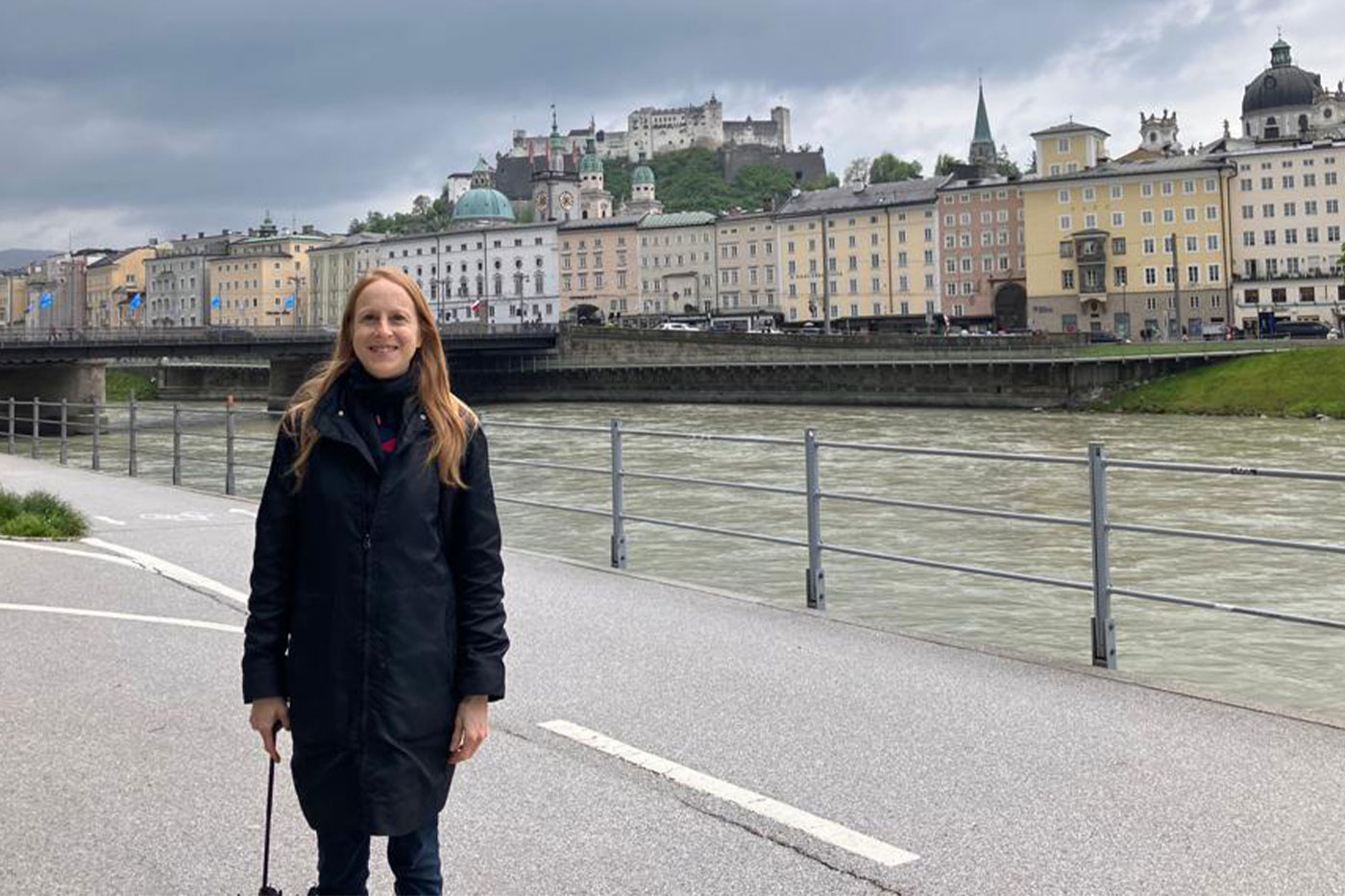Anita McChesney is one of two professors traveling to Austria as part of the latest cycle of Fulbright U.S. Scholar recipients from Texas Tech.
A short 10-minute walk from the Salzburg Hauptbahnhof train station leads to the famed Mirabell Gardens, a cultivated oasis lined with rosebushes. Amidst the site, the 17th-century Mirabell Palace is just yards away, and the 11th-century Hohensalzburg Fortress is visible from its perch across the Salzach River.
Anita McChesney, an associate professor of German, was first introduced to these sights of the timeless city of Salzburg in the fall of 1997.

A few months from now, in February 2025, McChesney will again return to the city that captured her heart years ago, but this time, as a representative of Texas Tech University and recipient of a Fulbright U.S. Scholar fellowship. This latest development could be called a full circle moment, but instead she calls it a launching pad for increased connection among herself, the Department of Classical and Modern Languages and Literature, and scholarship at Texas Tech and in Austria.
McChesney will teach undergraduate and graduate students at the Paris Lodron University of Salzburg for five months next year. She'll teach on images of Austria in both Austrian and American literature as part of the Fulbright-Botstiber Visiting Professor of Austrian American Studies in Austria program.
She’ll also research representations of Austria in contemporary literature and how they’re impacted by intersections with the U.S., with a specific focus on current political movements.
McChesney joins Kanika Batra (participating in Canada), Costică Brădăţan (Romania), Bryan Giemza (Belgium), Catherine Jai (Taiwan), Akbar Namin (Austria), and Jessica Yuan (Morocco) as Texas Tech professors traveling abroad for the Fulbright program.
“The Fulbright Program enriches the university by fostering cultural and academic exchange,” said Vice Provost of International AffairsElizabeth Trejos-Castillo. “Efforts to increase the number of Fulbright recipients reflect the university’s commitment to internationalization and dedication to promoting global understanding.
“International Affairs has actively promoted the Fulbright Program through a series of webinars, events, panel discussions, and on-on-one mentoring. These activities aim to provide professional development opportunities for faculty and enhance their readiness to apply for Fulbright programs.”
Born and raised by missionary parents in Zimbabwe, McChesney’s childhood inclined her to be curious about the culture and history of other countries. Her father, formerly a professor at what is now Solusi University in Bulawayo, shared his interest in European history and travel with her.
McChesney wouldn’t move to the U.S. until the age of 14, landing in Washington state. She attended college there, taking advantage of her first opportunity to study abroad by traveling to Braunau, Austria in 1994 for a one-year exchange program.
“I went over there and liked it so much that after two weeks, I asked how I could extend my stay.”
The time at the boarding school in Braunau provided a multicultural experience with people from various countries, reminiscent of her childhood. McChesney immediately felt at home.
After completing two years of the program and earning her bachelor’s degree in German and English, McChesney enrolled in graduate school at Bowling Green State University in Ohio that provided her with a chance to go back to Austria. This time, she took courses at the University of Salzburg, and the courses focused on Austrian culture and history solidified her love for the subjects.
Beyond the late 1990s, McChesney continued to visit Europe for numerous academic experiences. Most recently, she led the College of Arts & Sciences’ Summer in Munich program where she made sure to take students on the two-hour train ride east to Salzburg.
The country’s natural beauty and history make it easy to admire. Reminders of the Habsburg dynasty, the family who ruled Austria and controlled a vast empire for centuries, abound everywhere.
“It’s still very focused on the Habsburg time period, even though that’s over 100 years ago, and so you have the castles, and people still look back very fondly on that time,” McChesney explained. “That’s a cultural history that we don’t have in the United States, that imperial history, and it goes back over 1,000 years.”
In 2017, she got her first taste of the Fulbright experience while attending a summer seminar for American faculty of German studies in Leipzig. Living with a host family, participating in seminars, and completing assigned projects gave McChesney the vibe of being a student, but she wanted more.
Teaching at the University of Salzburg would present a different challenge, one in which she could teach European students and learn about the European school system from the inside.
McChesney feels she can take those lessons about dealing with students from Europe and what could be improved during her regular teaching at Texas Tech and apply them back home.
The seminar will explore how Austrian writers present their own country and contrast those examples with others from the American perspective, pursuing the concept of imagology, which McChesney describes as “how views of a nation are formed by themselves and externally.”
The research component of her approach will expand on one of her areas of exploration at Texas Tech, during which she’s previously scrutinized representations of Austria but never included the country’s intersections with the U.S. McChesney looks to further the Fulbright program’s objective of strengthening connections between America and Europe.
Parallels of right-wing political movements here and in Austria have drawn her attention.
The Freedom Party (FPÖ), a far-right, anti-immigration group, won a plurality of roughly 29% of votes in Austria’s parliamentary election Sept. 29. While the vote marked the first-ever victory for the FPÖ, McChesney noted party leader Herbert Kickl’s struggles to gain the support of another party leader that would allow the FPÖ to form a coalition government, in which Kickl would become chancellor.
“I just see a lot of similarities in the rhetoric, and so I was interested in looking at that in literature and seeing where the parallels are in American and Austrian culture that aren’t necessarily just because of immigration between the two,” said McChesney.
With two major waves of Austrian immigrants landing in the U.S. after World War I and World War II, she wants to see how those developments connect to similar cultural trends in the two countries and how those trends are discussed.
Austria and the U.S. have been inextricably linked for over a century now through the World Wars and what occurred afterward. McChesney learned the U.S. declared at the 1943 Moscow Conference that Austria was the first free country victimized by Adolf Hitler, which gave Austria an out from being subjected to pay reparations and established Austria as an ally of America.
The U.S. occupied Austria until 1955, though not splitting the country the way Germany was, which endeared America to Austrians.
“They were actually very grateful, and you see a lot of reflection of that today,” McChesney said.
That lengthy history provides plenty of opportunities for diving into images of Austria in literature.
One such example is “The Original Sound of Music Tour Salzburg,” a popular tourist attraction showcasing the sights from the 1965 film. It’s something most Austrian natives wouldn’t consider partaking in, but McChesney wonders what conclusions her students would draw after viewing tourists’ reactions to an American film about Austria.
All aspects of her trip fall under the Fulbright Program’s goals of strengthening cross-cultural connections.
McChesney acknowledges the ease of subscribing to the notion Americans don’t need to know other languages because English is virtually universal.
Simultaneously, she can point to numerous experiences while leading the Summer in Munich program each year in which she’s seen the excitement students have for being in another country, speaking that country’s language and learning firsthand the behaviors followed by its citizens.
“To learn from other people’s rich experiences, it is so eye-opening and world-opening.”
“I feel like when I go abroad, I can also give people elsewhere some ideas of what Americans are like,” said McChesney. "It’s not like there’s one American that’s defined by whatever they see on TV.”
She looks forward to interacting with her students and helping them understand what the U.S. is like and what Americans’ perspectives of Austria are. McChesney also said she’d like to connect them with Texas Tech students through virtual seminars or introductory Zoom sessions and encourage Austrian colleagues to attend conferences in the U.S.
Support at the university level has helped Texas Tech faculty like McChesney reach their goals of becoming Fulbright scholars.
The university has made more resources available to assist the application process, including a weekly summer group that included past Fulbrighters providing tips for applications and connecting applicants to work together.
McChesney said she found those measures useful and reassuring that Texas Tech was there for its faculty throughout the process.
“When I did hand in my application, I felt good that it was at least as strong as I could make it, because I’d gotten so much feedback from people who’d done Fulbright or who were applying for Fulbright,” she said.
Achieving the selection was especially validating as it was her second time applying, after finishing as the first runner up for the Salzburg program in 2022.
She was on cloud nine for a month once she learned she was accepted, not solely because of the chance to go back to Austria, but because of the weight associated with being a Fulbrighter.
Numerous people contacted her from the University of Salzburg and beyond, she was introduced to a new network of Fulbright scholars and she found a way into the German academic world that can be hard to access without help.
“With Fulbright, it immediately opens that door, because it has the name recognition and it also has the power of a U.S. institution with the inclusion of Texas Tech, so you realize you’re making connections between universities as well,” said McChesney.
Learning abroad is a key factor to what she sees as the whole purpose of attending a university, which is supposed to prepare students for their lives to come.
Experiences are complementary to skills developed in the classroom, and the number of Study Abroad programs offered through International Affairs means students of all backgrounds and majors can find an opportunity to travel beyond the U.S. McChesney also mentioned the Study Abroad office’s continued pursuit of new programs and constant support of students and faculty when abroad.
Students learn they’re global citizens and what they’re doing has a global impact.
“It really is a chance to launch students into the idea that we are a really big, global world where, ‘Yes, we’re all connected, but we’re not all the same, and that’s good,’” McChesney said. “When you start in a workplace, even if you end up living and working in Lubbock, you’re going to encounter people from other countries and other cultures, even if it’s from other parts of the U.S.”

